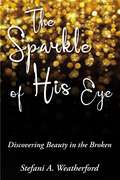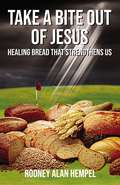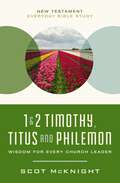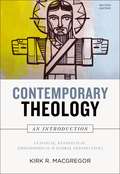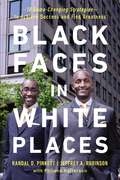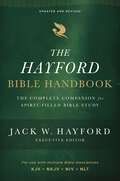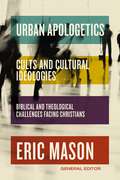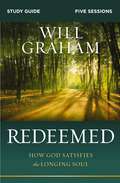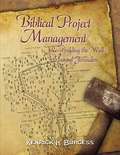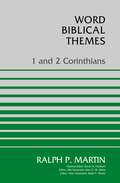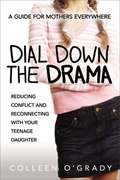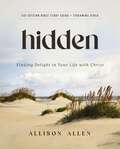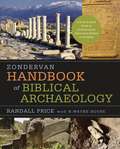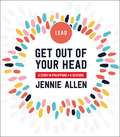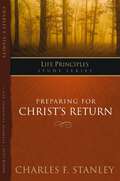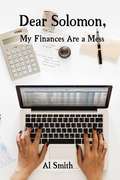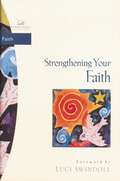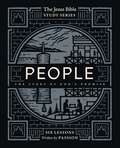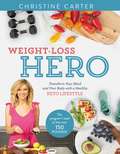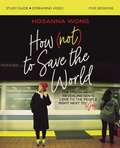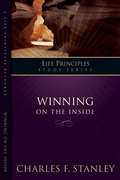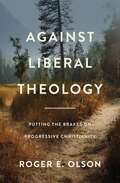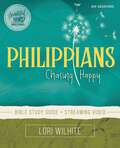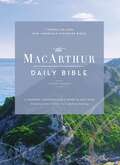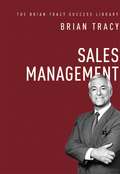- Table View
- List View
The Sparkle of His Eye the: Discovering Beauty in the Broken
by Stefani WeatherfordI couldn&’t wait until I had a sparkly diamond on my hand one day, signifying that I was loved and chosen. But once I no longer had the sparkle on my finger, I had to find it within. This book is about my seven-year journey with the Lord to discover the seven key elements that helped me to shine again.Strength--When I had nothing left, I met the ultimate source of strength that created a stability deep within.Provision--The Lord provides for us not just financially but in more ways than we could ask or imagine.Acceptance--The process of accepting the things I could not change so I could move on wasn&’t easy, but it was worth it.Release--Releasing forgiveness & faith so God could redeem my situation was critical in the healing process.Keep--Keeping my eyes focused on the Lord and staying under His covering propelled me into a future of joy and hope.Loved--Allowing God&’s love to penetrate my broken places and believe what He says about me restored my soul.Enough--Believing that Jesus says I am enough ever when dating makes me feel otherwise is often a daily surrender.
Take a Bite Out of Jesus: Healing Bread That Strengthens Us
by Rodney HempelTake a Bite Out Of Jesus is a spiritual lesson told by the author of his personal journey through hardships of failing health. Everyone at some point in their life will meet life-changing health challenges. We all have to manage our fading bodies but take heart! We are promised a new body that clothes us! The new is from heaven and is raised in glory! The Lord will raise us up on the last day and give believers an everlasting body having the properties associated with the body of Jesus! His strength is perfected in our weakness. This can encourage us as we cope with age-related health issues. So, take heart and partake of the Lords body while still in the flesh. Take a Bite Out Of Jesus right now! And, receive his promise of a better eternal body!
1 and 2 Timothy, Titus, and Philemon: Wisdom for Every Church Leader (New Testament Everyday Bible Study Series)
by Scot McKnightLeading People into the Way of Jesus"Scot McKnight is one of my absolute favorite New Testament scholars and his Everyday Bible Study series is akin to Einstein creating a user-friendly version of the Theory of Relativity!"—Lisa Harper, award-winning author and Bible teacherYou might not immediately think of yourself as a "leader," but the apostle Paul likely would. When Paul uses the term leader in a church context he includes anyone who mentors or cares for people into the way of Jesus.In this volume of the New Testament Everyday Bible Study series, Scot McKnight explores four letters written by Paul to three pastoral leaders—Timothy, Titus, and Philemon—and how they model wise advice for leaders in the churches of Ephesus, Crete, and Colossae.Throughout the study of these four letters, McKnight reveals important elements of leadership for us today through Paul's mentoring of these three leaders. The first three letters are commonly referred to as the Pastoral Epistles, as Paul pastors Timothy and Titus on how to lead churches in Ephesus and Crete, and in the fourth letter, Paul pastors Philemon to lead a house church through a challenge.While these letters are specific to their contexts, they offer timeless wisdom for all sorts of church leaders, from parents and teachers to pastors and business leaders.In the New Testament Everyday Bible Study Series, widely respected biblical scholar Scot McKnight combines interpretive insights with pastoral wisdom for all the books of the New Testament. Each volume provides:Original Meaning. Brief, precise expositions of the biblical text and offers a clear focus for the central message of each passage.Fresh Interpretation. Brings the passage alive with fresh images and what it means to follow King Jesus.Practical Application. Biblical connections and questions for reflection and application for each passage.
Contemporary Theology: Classical, Evangelical, Philosophical, and Global Perspectives
by Kirk R. MacGregorAccessible and comprehensive, Contemporary Theology: An Introduction by professor and author Kirk R. MacGregor provides a chronological survey of the major thinkers and schools of thought in modern theology in a manner that is both approachable and intriguing.Unique among introductions to contemporary theology, MacGregor includes:Evangelical perspectives alongside mainline and liberal developmentsThe influence of philosophy and the recent Christian philosophical renaissance on theologyGlobal contributionsRecent developments in exegetical theologyThe implications of theological shifts on ethics and church lifeContemporary Theology: An Introduction is noteworthy for making complex thought understandable and for tracing the landscape of modern theology in a well-organized and easy-to-follow manner.
Black Faces in White Places: 10 Game-Changing Strategies to Achieve Success and Find Greatness
by Philana Patterson Randal D. Pinkett Jeffrey A. RobinsonDiscover how African-American professionals can combine their personal strengths with the wisdom of others to plant the seeds of a positive, lasting legacy in the workplace.Randal Pinkett was the first African-American winner on The Apprentice. When he won, he also became the only contestant to be asked to share his victory with a white woman.For generations, African-Americans have been told that they need to work twice as hard as everyone else to succeed. However, as millions of black Americans were reminded by Pinkett's experience, sometimes hard work is not enough.Black Faces in White Places is about "the game", the competitive world in which we all live and work. The book offers 10 revolutionary strategies for playing, mastering, and changing the game for the current generation, while undertaking a wholesale redefinition of the rules for those who will follow.In this book, you will:Expand yourself beyond your comfort zoneRecognize and demonstrate the four facets of excellenceBuild beneficial relationships and powerful networksIdentify different mentors and learn from others' experiencesDiscover ways of working with others to facilitate collective actionBased on the authors' considerable experiences in business, in the public eye, and in the minority, the book shows how African-American professionals can (and must) think and act both entrepreneurially and "intrapreneurially".Black Faces in White Places not only explains shattering the old "glass ceiling&” and changing the concept of success, but also examines the four dimensions of the contemporary black experience: identity, society, meritocracy, and opportunity.
The Hayford Bible Handbook
by Jack W. HayfordThe Hayford Bible Handbook continues to offer charismatic and Pentecostal Christians a major reference tool that provides easy access to a wealth of biblical and practical information.Are you a Spirit-filled Christian who longs for fresh insights from the Bible? Do you want God's truth to challenge you, and change you, and bless others through you in ways you never thought possible?The Hayford Bible Handbook is an unparalleled resource that unveils the Keys to Scripture uniquely, providing not only a wealth of information, but also a spiritual stimulus that will encourage your faith and service to Christ.FeaturesKingdom Keys to opening up Spirit-filled life emphases in each Bible bookAn informative Survey section for each book of the BibleHundreds of Kingdom Life Insights™, offering Spirit-filled life perspectives on individual versesA Truth-in-Action chart for each Bible book, highlighting practical principles and specific actions that might grow out of themThe unique Spirit-Filled Life® Encyclopedic Dictionary with over 1300 entries, including word studies and Kingdom Dynamics articlesVisual Survey of the Bible
Urban Apologetics: Biblical and Theological Challenges Facing Christians (Urban Apologetics)
by Eric MasonWe know that Urban isn't just a place but a culture now. Followers of Jesus face many challenges to their faith, among them the rising influence of contemporary cults, alternative theologies, and ethical issues that challenge traditionally held beliefs and practices. Urban Apologetics: Cults and Cultural Ideologies, is a follow-up to the bestselling Urban Apologetics, and it provides a guide to addressing these challenges with grace and wisdom. In addition, throughout the book are short essays by leaders in the church sharing their convictions on successful ministry and reflection on today's challenges in light of the past.This all-new volume addresses several of today's most-talked-about issues, including:Jehovah WitnessesThe Prosperity GospelBlack Liberation theologyLGBTQ+ IssuesCritical Race Theory (CRT)White NationalismFaith DeconstructionEdited by Dr. Eric Mason and featuring a top-notch lineup of contributors such as Anthony Bradley, Brandon Washington, and Thabiti Anyabwile, Urban Apologetics: Cults and Cultural Ideologies equips pastors, churches, and everyday believers to engage the most common ethical, biblical, and theological challenges faced by Christians and the church today.
Redeemed Bible Study Guide: How God Satisfies the Longing Soul
by Will GrahamOnly God can satisfy the hungry soul.In this five-session video Bible study, Will Graham, the grandson of renowned preacher Billy Graham, shares stories and teachings from his life about what it means to be redeemed in Christ. As Will has traveled the globe, he has observed that deep inside each of our souls, we are all hungering for something. Some of us try to satisfy that need by throwing ourselves into relationships, jobs, or hobbies. Some try to fill the hunger by engaging in destructive vices. Others pursue good deeds, social work, or donating money to worthy causes. But as the psalmist writes, only God &“satisfies the longing soul, and fills the hungry soul with goodness&” (Psalm 107:9 NKJV).As we experience this redemption and walk in God&’s ways, He leads us to a new understanding of His love, helps us to let go of our past, gives us a new heart and outlook on our trials, and opens our eyes to see the eternal needs of those around us.The Redeemed Study Guide includes video teaching notes, discussion questions, Bible exploration, and weekly personal study and reflection materials.Sessions include:A New Understanding of God&’s LoveA New Sense of Freedom from the PastA New Heart and PurposeA New Outlook on DifficultiesA New Longing to Share ChristDesigned for use with the Redeemed Video Study (9780310099796) sold separately. Digital and streaming video also available.
Biblical Project Management: Re-Building the Wall Around Jerusalem
by Kenrick H. BurgessThis book is about biblical project management, principles, tools, techniques, and practices used by Nehemiah, a cupbearer to the King of the Persian Empire in the re-building of the wall around Jerusalem and its revitalization. It can be used as a manual for project recovery by project sponsors, owners, leaders, project managers and teams managing projects.The book has three parts:Part One deals with the characteristics and definitions of a project and biblical project management, the roles of a project manager, and the importance of stewardship in project management. There is also a brief overview of the Bible, its inspired writers, its impact, legal, financial, and project management systems.Part Two examines Nehemiah&’s project recovery management methodology, and his incredible use of advanced project management tools and techniques are demonstrated by referring to the approaches that he used to re-build the wall and achieve spiritual revival in Jerusalem.The reader will learn:about Jerusalem in the time of Nehemiahhow to prepare a project background and project definition reporthow to make successful interventions and to present the case for the recovery of a project to owners, sponsors, politicians and public officialshow to conduct a detailed assessment of a troubled projecthow to do project reviews and document the variances in the scope of works, objectives, milestones, resources, quality, risks and expected deliverables, and to decide on the way forwardabout the capabilities required by the project manager to rescue projects such as courage; leadership; project management skills; technical competencies; project knowledge and understanding; wisdom; solving disputes; assessing the actual scope of works required; and evaluating the cultural, political, economic, social, environmental, and technical issueswhat to include in a final assessment reporthow to prepare the work breakdown structure, precedence network diagram; milestone plan, responsibility matrix, project organization, risk management planhow to develop the fifteen plans necessary for construction and control planningteamwork strategies, networking, project oversight, monitoring, tracking, construction management, stakeholders&’ management and analyses, reasons why projects fail, the role of a project champion, and critical success factors for rescuing troubled projectsNehemiah&’s project recovery management methodologyhow to revitalize and bring spiritual revival to a cityhow to conduct an ex-post evaluation of a project, andhow to dedicate a project.Part Three discusses a) the significance-driven project manager; b) leadership; c) the significance of the walls, towers and gates around Jerusalem; d) how to follow the footsteps of Nehemiah, and e) power tools and power required for project managers.
1 and 2 Corinthians: 12 Lessons About Making Tough Choices In Tough Times (Word Biblical Themes #15)
by Ralph P. MartinA companion series to the acclaimed Word Biblical CommentaryFinding the great themes of the books of the Bible is essential to the study of God's Word and to the preaching and teaching of its truths. These themes and ideas are often like precious gems: they lie beneath the surface and can only be discovered with some difficulty. While commentaries are useful for helping readers understand the content of a verse or chapter, they are not usually designed to help the reader to trace important subjects systematically within a given book a Scripture.The Word Biblical Themes series helps readers discover the important themes of a book of the Bible. This series distills the theological essence of a given book of Scripture and serves it up in ways that enrich the preaching, teaching, worship, and discipleship of God's people. Volumes in this series:Written by top biblical scholarsFeature authors who wrote on the same book of the Bible for the Word Biblical Commentary seriesDistill deep and focused study on a biblical book into the most important themes and practical applications of themGive reader&’s an ability to see the "big picture" of a book of the Bible by understanding what topics and concerns were most important to the biblical writersHelp address pressing issues in the church today by showing readers see how the biblical writers approached similar issues in their dayIdeal for sermon preparation and for other teaching in the church Word Biblical Themes are an ideal resource for any reader who has used and benefited from the Word Biblical Commentary series, and will help pastors, bible teachers, and students as they seek to understand and apply God&’s word to their ministry and learning.
Dial Down the Drama: Reducing Conflict and Reconnecting with Your Teenage Daughter¿A Guide for Mothers Everywhere
by Colleen O'GradyTeen daughters are on an emotional rollercoaster, and responding in kind adds fuel to the fire. It&’s important for moms to be a stable anchor during this stage in their life.Family therapist and mom Colleen O&’Grady shares what she learned firsthand during her own daughter&’s teenage years about how best to calmly de-escalate even the most stressful scenes and parent intentionally even when your teen is pushing you away.In Dial Down the Drama, O&’Grady shows every mom how to learn to:Regain perspectiveBreak the cycle of conflictTune into her daughter without drowning in the dramaFoster spontaneous conversationsReplace worrying and overreacting with effective communication and actionAnd much more!Moodiness, anger, and defiance can stress the best of us. This empowering guide gives you the tools you need to defuse the drama - and dial up the joy.As Colleen has said, you don&’t dial down the drama in order to survive the teenage years; you do so because you actually can enjoy them! Dial Down the Drama provides the tools you need to do just that.
Hidden Bible Study Guide plus Streaming Video: Finding Delight in Your Life with Christ
by Allison AllenYou don't have to perform anymore. You are hidden in Christ and need nobody's favor.We live in a world that tells you that visibility is value, that recognition is your greatest reward. Even though we know it's empty, so many of us are enslaved to this culture of performance and people-pleasing, earthly accolades and social media likes. As a former actor, Allison Allen knows what it's like to feel like she had to perform—not only for others, but even for God's favor.In this video Bible study (video access included), you're invited to let go of the pressure you feel and lean into the freedom of your inherent value in Christ. Throughout these sessions, you'll spend time in the forgotten corners of Scripture and get to know some of the most hidden, least remembered people in the Bible.What do they have to tell us about a life that doesn't seek to be seen?This study guide has everything you need for a full Bible study experience, including:Biblical context and character studies—including the Sons of Korah, Cleopas, Huldah, the Daughters of Shallum, Pilate's Wife, and Gideon.Group discussion questions.Individual access to six streaming video lessons from Allison.Personal Bible study between sessions for reflection and application.Inspirational character readings by Allison. Sessions and video run times:Hidden Treasures (20:00)Where All Good Things Are Found (21:00)Choosing Excellence Over Exposure (21:00)What Lies Beneath the Surface of Our Lives (22:00)Out of Hiding (19:00)From Strength to Strength (22:00) Streaming video access included. Access code subject to expiration after 12/31/2029. Code may be redeemed only by the recipient of this package. Code may not be transferred or sold separately from this package. Internet connection required. Void where prohibited, taxed, or restricted by law. Additional offer details inside.Join Allison Allen as she explores the power, purpose, and delight of hiddenness in Christ.
Zondervan Handbook of Biblical Archaeology: A Book by Book Guide to Archaeological Discoveries Related to the Bible
by H. Wayne House J. Randall PriceExplore significant archaeological discoveries pertaining to every book of the Bible.Laypersons, pastors, students, academics, and anyone looking for a current and comprehensive biblical archaeology resource need look no further. The Zondervan Handbook of Biblical Archaeology provides a wealth of information that supplements the historical context of the Bible, providing a window into the past that will enhance your understanding and enjoyment of biblical text.Immerse yourself in the world of the Bible and the intertestamental period with these special features:Introduction to the field of archaeologyArchaeological discoveries in canonical orderThe latest photos and information from new discoveriesAerial photos of excavation sitesPhotos of artifacts and historic structuresSidebars and study helpsRobust glossaryDetailed mapsBibliographyThe Zondervan Handbook of Biblical Archaeology gives readers the opportunity to visit ancient sites and historical places while remaining in the comfort of their own home.
Get Out of Your Head Bible Study Leader's Guide: A Study in Philippians
by Jennie AllenStopping the spiral of toxic thoughts.In Get Out of Your Head, a six-session video-based Bible study, Jennie inspires and equips us to transform our emotions, our outlook, and even our circumstances by taking control of our thoughts. Our enemy is determined to get in our heads to make us feel helpless, overwhelmed, and incapable of making a difference for the kingdom of God. But when we submit our minds to Christ, the promises of goodness of God flood our lives in remarkable ways.It starts in your head. And from there, the possibilities are endless.This guide serves as a tool to prepare you in leading this Get Out of Your Head study and to encourage you along the way. It helps you as the leader to effectively point your group to the overarching theme of each lesson and point them to the themes of each study.This Get Out of Your Head Leader&’s Guide includes:Session-by-session helps to guide your group through the study.Walk-through for using each piece of the study: Videos, Study Guide, and Conversation Card Deck.The vision for Get Out of Your Head.Tips for leading your group, and much more.This guide is designed for use with the Get Out of Your Head Video Study (9780310116394), sold separately. Streaming video, study guide, and conversation cards also available.
Preparing for Christ's Return (Life Principles Study Series)
by Charles F. StanleyThe most exhilarating moment since the resurrection may happen today! Are you ready?This was the attitude of early Christians—to be ready each moment for Christ's promised return, dedicating themselves to His work on earth in the meantime. The disciples and first-century Christians eagerly anticipated Christ's second coming and talked about it daily like we talk about our team's chance for the Super Bowl.In Preparing for Christ's Return, Dr. Charles Stanley will teach you how to live a life of satisfaction, purpose, meaning, and readiness—a life that brings great reward now and in eternity.With over 1 million copies sold, the Charles F. Stanley Bible Study Series is a unique approach to Bible study, incorporating biblical truth, personal insights, emotional responses, and a call to action.Each study draws on Dr. Stanley&’s many years of teaching the guiding principles found in God&’s Word, showing how we can apply them in practical ways to every situation we face.Each of the ten lessons includes:A brief look at what is covered in the lesson.A teaching from Dr. Stanley that unpacks the topic of the lesson.Application and Bible study questions based on the key points.Key takeaways to put into practice today and tomorrow.
Dear Solomon, My Finances Are a Mess
by Al SmithTaming the Money Beast is often a conquest that is never achieved even by those who put forth the effort. One could get multiple university degrees with honors, but never be instructed on even the basics of handling money.Money is simply a tool. In the hands of someone who has acquired and cultivated the skills to use it, money can bring about incredible benefits to be enjoyed by many. In the hands of a novice or one void of skills, money can bring tremendous trouble and even destroy lives. The pursuit of wisdom and understanding in expertly using this tool, is a worthy pursuit.This book draws from the wisdom of Solomon, the wealthiest man to ever live and a man God endowed with &“a wise and discerning heart&” like none other (1 Kings 3:12).The wisdom of Solomon is displayed everywhere you look. Study any Fortune Five Hundred company, and you will discover that their success can be attributed to following this wisdom. Study companies that have failed and you will discover many of Solomon&’s proverbs have been violated. The same holds true for individuals. The principles taught in Proverbs are divine laws that are always active just as much as the laws of physics are active.The Book of Proverbs, primarily authored by Solomon, is filled with practical wisdom in virtually all areas of life, including being packed with verses devoted to financial matters. This wisdom is ageless and will benefit all who set their hearts to learn and discern.Contained within the pages of this book, are the essential principle of being a seeker of wisdom and knowledge. You will learn the vital importance of developing character, cultivating integrity, and guarding your reputation. On how your life should be marked by being an excellent worker. This requires skills in planning, setting priorities, recognizing and seizing opportunities, and avoiding the pitfalls of pursuing riches at the expense of all else.The vital characteristic of focus and commitment will help you with motives, curb your impatience, reveal greed, and unpack the dangers of a lottery mentality. The peril of accumulating debt, the foolishness of perpetually overspending, and the tendency to be wasteful are examined.Falsehoods are exposed. Solomon is not interested in making sure he does not offend you he is interested in being brutally honest with you. So, this book includes admonitions on tempering false expectations, understanding false impressions, avoiding false security, and basing your financial life on truth.As with any endeavor, one must recognize and eradicate the weeds that will overtake progress include compromise, envy, phoniness, injustice, and arrogance. Solomon is clear on the folly of allowing these weeds to take root.Having proper attitudes are also important principles discussed in this book. We must learn the value of generosity, the wisdom of teamwork, and the damaging role that unchecked selfishness can play.Of course, handling money wisely is the essence of this book. Preparation is the key and you cannot skip or rush over this key. Preparation always precedes the proper use of money. Paying attention to details will serve you well. Knowing and understanding where you stand each step of the way is essential.These principles work regardless of your spiritual beliefs, but there is a spiritual component at work in these truths. Without fail, if this wisdom is diligently followed and incessantly applied, you will at times be amazed at the results; results that cannot easily be explained.This book will take you on a journey if you are game; it is a long journey but an exciting one. It will give you a spring in your step and have you eager to arise in the morning. It will give you a sense of true accomplishment before as you rest you head on the pillow at night. I promise that you won&’t be sorry if you make the commitment and resolve to finally understand the rules of the financial road. The path is open before you – all are welcome!
Strengthening Your Faith (Women of Faith Study Guide Series)
by Beverly WilsonThe Women of Faith Study Series helps you turn the laughter and lessons of Women of Faith conferences into a journey of growth shared by special friends. Whether or not you've attended a conference, you will appreciate the bonds that form as you join with other women linked together in friendship, prayer, joy, and faith. Each study will also lead you to a deeper love of the Bible and a greater appreciation of the power of God's Word. Each session includes six sections: A Moment for Quiet Reflection . . . Just for Fun - Knowing God's Heart . . . Praying Together - Friendship Boosters . . . Making it Real in Your Own Life. The leaders guide that's included makes it easy to facilitate weekly Bible studies that will nurture your knowledge of Scripture and your sense of God's presence in your life. Six Sessions Include -- The Women of Ill Repute: Extravagant Faith - Elizabeth: Intimate Faith - Sarah: Laughing Faith - Ruth: Obedient Faith - Mary Magdalene: Unwavering Faith - Martha: Obedient Faith
People Bible Study Guide: The Story of God’s Promise (Jesus Bible Study Series)
by Passion PublishingWhen God&’s people break their word, God keeps his promise.Not only is your story woven into God's larger story, but you are also part of the tribe whom God is calling to himself. In the six lessons of People, you will explore how the nation of Israel was impacted by the unfolding drama of their cycle of revolt against God, and why the Lord commissioned a chosen people who would be a witness on earth of his faithfulness. Time and time again, God's people turned their backs on him, but God was always quick to show mercy when they repented and called out to him. The cycle we see again and again throughout the Old Testament isn't just about the Israelites; it's also about us. We are all participants in the pattern of revolt, repentance, and restoration.People will help you see how God works out his glorious plans, despite our defiance, to bring his promises to fruition, and you will also grasp that no matter how many times you turn away, God seeks you out to bring you back. Every time. People is the third of six volumes in the Jesus Bible Study Series, following Beginnings and Revolt. Work through all the volumes in any order individually or within a group setting.Each study in this series features one of six key &“acts&” of Scripture:BeginningsRevoltPeopleSaviorChurchForever
Weight-Loss Hero: Transform Your Mind and Your Body with a Healthy Keto Lifestyle
by Christine CarterDiscover the many benefits to the ketogenic diet beyond weight loss--including reduced anxiety, minimized depression, and even a reduction or elimination of prescription medications. In Weight-Loss Hero, wildly popular health coach Christine Carter shares her story of leaving behind roller-coaster dieting and losing more than 150 pounds by first changing the way she thought about weight and her own worth. By teaching us how to nourish our minds so we can properly nourish our bodies, Christine provides a sustainable path to a fully integrated healthy low-carb lifestyle.Features include:More than 50 original recipes with photosInspiring workout tipsPractical ways to incorporate a healthy keto diet into your lifeKeto-friendly grocery listsRecommended keto-friendly meals at popular restaurantsChristine uses her personal stories of overcoming failure to encourage us as only the best coaches can. With almost 300,000 Instagram followers and features in Shape, Fitness, Popsugar.com, and TODAY.com, Christine already has enthusiastic fans around the world. As she reminds us, when it comes to healthy living, weight loss doesn't begin with a new diet or exercise plan. It begins in the mind.
How (Not) to Save the World Bible Study Guide plus Streaming Video: The Truth About Revealing God’s Love to the People Right Next to You
by Hosanna WongDisplaying God&’s love in today&’s world.When it comes to talking about Jesus with our family members, friends, classmates, and coworkers, many of us aren't sure how to go about doing it. We don't want to come off as awkward, pushy, or weird. We wonder if we have the right answers or if we'll say the wrong thing. As a result, we sometimes give up on sharing about Jesus altogether.In this five-session study, bestselling author and spoken-word artist Hosanna Wong crushes the lies that hold us back from sharing the most important story in the world. Join Hosanna in discovering what God's Word actually says about revealing His love to the people right next us, and how we are already equipped to reach those who don't know how much God loves them (yet).With honesty and humor, Hosanna will help you:Embrace your unique story to naturally talk about Jesus without being weird or pushy.Discover the three most effective steps to take when fighting for a loved one who is in a tough place.Overcome the lies that hold you back so you can step into your calling and empower people to encounter God.Heal from past hurts in the church and learn how to create the community you've longed for.This study guide has everything you need for a full Bible study experience, including:The study guide itself - video teaching notes, group discussion questions, and in-between gatherings personal Bible study sections.An individual access code to stream all five video sessions online (you don't need to buy a DVD!).Watch on any device!Streaming video access code included. Access code subject to expiration after 12/31/2027. Code may be redeemed only by the recipient of this package. Code may not be transferred or sold separately from this package. Internet connection required. Void where prohibited, taxed, or restricted by law. Additional offer details inside.
Winning on the Inside (Life Principles Study Series)
by Charles F. StanleySpiritual inspiration for overcoming temptation.Most people believe that they have a good grasp of what it means to be tempted. They've faced temptation in their lives, they know the right response, and they want to say no to temptation. But most people also admit that they frequently give in to temptation, and they bear guilt about doing so. What these people do not know, in part, is the whole of what the Bible has to say about temptation and how to overcome it…In Winning on the Inside Dr. Charles Stanley defines temptation, takes a look at the broader picture of spiritual warfare, and reveals the practical measures we can take to defend ourselves against the enemy's whispers. Understanding what Scripture says about temptation, sin, and how God's Spirit intercedes on our behalf can help us in times of need.With over 1 million copies sold, the Charles F. Stanley Bible Study Series is a unique approach to Bible study, incorporating biblical truth, personal insights, emotional responses, and a call to action.Each study draws on Dr. Stanley's many years of teaching the guiding principles found in God's Word, showing how we can apply them in practical ways to every situation we face.Each of the ten lessons includes:A brief look at what is covered in the lesson.A teaching from Dr. Stanley that unpacks the topic of the lesson.Application and Bible study questions based on the key points.Key takeaways to put into practice today and tomorrow.
Against Liberal Theology: Putting the Brakes on Progressive Christianity
by Roger E. OlsonLiberal Christian theology is a big topic in today's churches and seminaries. But what does liberal theology really mean and why is it so controversial? What does it actually believe about truth, Scripture, and Jesus Christ? And where does it lead?The term "liberal theology" is often misinterpreted, confused with a set of loose ideologies within the Christian faith and sometimes rallied behind by genuine Christians who are simply concerned about modern social justice issues. It's also been wrongly leveled against churches and even entire denominations that don't adhere to the tradition of liberal theology.Against Liberal Theology, is written in a direct and conversational tone that makes sense of this theological movement by:Defining liberal theology and explaining its beliefs about central Christian doctrines.Giving its history and progression—beginning with 18th century German theologian Friedrich Schleiermacher and leading up to today.Making distinctions between liberal theology and simple moderate or progressive Christian thought, much of which is still biblically committed and doctrinally orthodox.Discussing the arguments of specific liberal theologians and what their words mean in regard to everyday Christian living and faith.Sincere and to the point, professor and theologian Roger E. Olson is not interested in grinding axes. He openly admits to frustration with fundamentalist Christianity and explains why. But he warns that true liberal theology—more concerned with making Christianity palatable to the modern mind than it is committed to biblical integrity—isn't the right alternative to the cultic tendencies of fundamentalism and has little in common with classical, biblical Christianity.Against Liberal Theology is perfect for Christians on any side of a cultural debate—for those who consider themselves progressive or conservative or something in between.It's always unpopular to be against anything. But in order for Christianity to be anything, it has to stand against some things. If Christianity is compatible with anything and everything, it is nothing.
Philippians Bible Study Guide plus Streaming Video: Chasing Happy (Beautiful Word Bible Studies)
by Lori WilhiteDISCOVER THE HAPPINESS YOU&’VE BEEN CHASINGMany of us spend our lives chasing happy through relationships, success, and the next adventure. Yet, we only discover a dryness in our souls. Why? Because we&’re chasing the wrong kind of happy. We chase temporary happiness instead of the eternal happiness found in Jesus.Sometimes, we wonder if God wants us to be happy. Someone said that God cares more about our holiness than our happiness like the two are disconnected. But what if the pursuit of happiness was adjacent to the pursuit of holiness?The problem isn&’t that God doesn&’t want us to be happy. The problem is that we&’re chasing happy in the wrong things. Happiness is ours when we chase God&’s joy, His purpose, His unity, His contentment, and His peace. Happy is captured when we chase Him.If you&’ve ever struggled with laying hold of true happiness, this study is for you! Discover the incredible truth that happy isn&’t found in the circumstances around us, but the power of Jesus in us.This study guide includes:Individual access to six streaming video talks from LoriGroup discussion questions and an opening group activity for each sessionIn-depth personal Bible study between sessionsReading plan through the entire book of PhilippiansScripture memory cards and coloring pagesSESSIONS AND VIDEO RUN TIMES:Chasing Joy (24:00)Chasing Purpose (21:30)Chasing Unity (23:00)Chasing Jesus (21:30)Chasing Peace (21:30)Chasing Contentment (20:00)This study guide has everything you need for a full Bible study experience, including:The study guide itself—with discussion and reflection questions, video notes, and a leader's guide.An individual access code to stream all video sessions online. (You don&’t need to buy a DVD!)Streaming video access code included. Access code subject to expiration after 12/31/2028. Code may be redeemed only by the recipient of this package. Code may not be transferred or sold separately from this package. Internet connection required. Void where prohibited, taxed, or restricted by law. Additional offer details inside.
NASB, MacArthur Daily Bible, 2nd Edition, Comfort Print
by Thomas NelsonExplore the Bible alongside daily insights from pastor-teacher Dr. John MacArthurFor more than 50 years, Dr. John MacArthur has helped Christians gain greater clarity and insight into Scripture. Now you can read through the Bible in a year while learning from wisdom gleaned from a lifetime of study with The MacArthur Daily Bible. This Bible offers an achievable approach to reading the entire Bible with readings from the Old and New Testaments, Psalms, and Proverbs for each day of the year. Combined with insights drawn from The MacArthur Study Bible, you will gain greater clarity and understanding as you read. Features include:The complete NASB (1995) translation presented with daily readings from the Old and New Testaments, Psalms, and ProverbsDaily notes from Dr. John MacArthur drawn from the MacArthur Study Bible, Second Edition, to help you better understand key truths in Scripture52 key passages of the Bible for study and memorizationDaily use Bible with devotional questions to improve your reading God&’s WordClear and readable 10-point text size
Sales Management (The\brian Tracy Success Library)
by Brian TracyThe pressure surrounding the sales manager is intense. Given the task of recruiting, managing, and motivating a top team of high-performing sales professions, so much of the sales manager’s success is dependent on others. Or is it?Sales expert Brian Tracy has spent decades studying the most successful sales managers and professionals in every industry. In this indispensable pocket-sized resource, he has encapsulated 6 key characteristics of a winning sales team. In Sales Management, he distills these simple but powerful strategies so that sales managers can learn how to:• Select and recruit sales champions• Establish clear objectives• Inspire singleness of purpose• Motivate people with the right incentives• Develop winners through continuous coaching and training• Conduct game-changing performance reviews• De-hire poor performers• And moreDon’t leave your success as a sales manager in the hands of others. Learn today how YOU can increase your sales team’s effectiveness, improve their bottom line, and advance your own career in the process.
